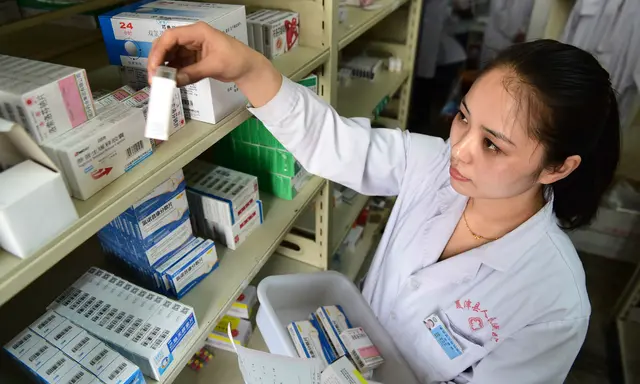Hu Xuna, from China's southern city of Guangzhou, used to hate taking her child to the doctor. But she dreads it less now that she can skip the long lines and pay the bill with a few taps on her smartphone.
Going to a hospital, especially a big one, in a country with a population of 1.3 billion is a challenge. While seeing a doctor might take only minutes, waiting in line for an appointment, tests, and paying the bill can take hours.
"It used to take me almost half an hour just to get the bills paid before I could get the medicine," said Hu. "Now I can just walk away without paying anything."
The simplified process was made possible by Ant Financial, the financial arm of China's Internet giant Alibaba Group. By partnering with Guangzhou Women and Children's Medical Center, one of the country's biggest hospitals specializing in women's health and pediatrics, Ant Financial is offering patients with high credit scores the option to pay after leaving the hospital through its Alipay, a popular online payment app similar to Paypal.
As the country expands health insurance coverage and establishes a "social credit system" that gives every citizen a reputation score, the Chinese hospital experience is improving.
Hu no longer needs to wait in line to pay bills thanks to her high score on Sesame Credit, a credit-scoring system by Ant Financial for its 400 million users. The score is based on data such as a user's online purchase history, income level, and educational background.
Anyone who scores above 650 on Sesame, representing the top 30 percent of all users, is considered eligible to let Alipay deduct hospital expenses from their linked bank account after treatment.
"It's like Uber, where you leave the car without taking out your wallet," said Zhang Zhiyao, vice director at Guangzhou Women and Children's Medical Center. "You see the doctor, walk out of the hospital, and it's done."
Unlike Uber, medical bills are usually much higher, raising the question: what if patients default?
"The risk is containable," said Zhang. "It's interesting that we Chinese always save for potential sickness."
Since the hospital started the service in February, 950 high credit patients have chosen the option to pay after leaving the hospital, and there has yet to be a default case.
To reduce the risks, the pay later option can only be used for expenses under 3,000 yuan (464 U.S. dollars) and anyone who defaults will see a decreased credit score. A lowered credit score can harm one's ability to obtain travel visas and rent a car or book a hotel without upfront charges.
Sesame Credit is one of eight institutions approved by China's central bank to conduct personal credit reports as the country works to build a nationwide "social credit system." The central bank itself has also established its own "credit reference center," which has created credit profiles for more than 860 million people.
As the credit system continues to improve, more patients, especially those in big cities, may be able to avoid long lines at hospitals to pay their bills, according to Zhang.
Many at the Guangzhou Women and Children's Medical Center still choose to line up because the current "pay after treatment" option only supports those who pay without health insurance.
But soon patients using the option will only have to pay the remaining bill after expenses covered by health insurance are deducted, according to the medical center, which could potentially raise the upper balance limit that can be paid through the time-saving option.
"That will also save me a lot more money," said Hu. "It just makes life much easier."
 简体中文
简体中文

